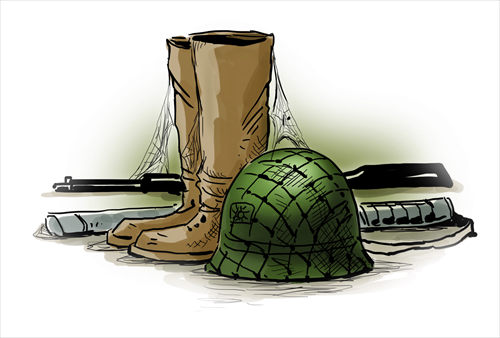HOME >> OP-ED
Without sincere apologies, my generation can’t forgive Tokyo
Source:Global Times Published: 2014-10-19 22:23:01

Illustration: Liu Rui/GT
Mentioning Japan, people at my generation barely have any favorable feelings. This does not come from nowhere.
We experienced the hatred against Japan the wartime. Until today, some Japanese politicians still publicly deny or raise doubts against the facts of the Nanjing Massacre in 1937, although some Japanese veterans have confessed to their crimes.
It is not uncommon to hear calls for historical tolerance, but that is based on a necessary recognition of very basic historical facts. How can you require my generation, who walked all the way from the dark past, to show a saintly tolerance when the basic conditions like these haven't been met?
I was born in a small village in northern Jiangsu Province. In the 1940s, Japanese soldiers were briefly stationed in Lushe, a village about two to three kilometers from my village. I was about 20 years old at that time.
Everybody fled before the Japanese arrived. I heard that whoever caught by the Japanese soldiers was required to show his hands - if the hands were not rough and calloused, the person would be considered to be a Chinese soldier, rather than a farmer, and instantly executed.
I remember some people around tried to rub their hands to make the calluses evident, in case they were caught. But that was futile. Those who got caught were never heard of again.
We heard of rapes too. Women, no matter how old, were raped if caught. I heard about a 12-year-old girl who experienced this tragedy. And the women, after being raped, were killed.
Despite the Japanese brutality, public determination to oust the Japanese soldiers from the Chinese territory was firm and solid. I was still attending normal school and was about to become a teacher back then. I remember we wrote lots of slogans, calling for people to hide grain and food.
I still remember one of the slogans, written in the season when the wheat was golden and mature, warning people against Japanese soldiers' looting, and asking them to reap, scour, and hide the crop quickly. Songs were also common among the children's corps, allowing the kids to encourage themselves.
Ordinary people started to make shoes for Chinese soldiers. Some collected waste iron and sent it to the military, hoping they could use it to make bullets and beat the Japanese.
At that time, the Japanese army practiced the policy of "burn all, kill all and loot all." After they left the Lushe village, local residents came back. Trees were sawed down, and human feces were found on tables, and in flour bags.
It was a pity that the Chinese united front against Japanese invasion wasn't solid and long-lasting. Cracks between the Nationalists and the Communists never totally faded. Besides, some Chinese were willing to work for the Japanese.
I still remember a person named Zheng Xiuxian, who undertook a leading role in the so-called "peace preservation association" to help Japanese rule and to provide whatever the Japanese wanted.
Zheng sent his niece to be a concubine for a Japanese officer. Zheng himself was executed by the Chinese army. His niece didn't suffer more after 1949. She later became a teacher like me. After all, she was forced to stay with the Japanese officer, and she was a victim too.
Some believe China should be tough and dare go to war with Japan. I cannot agree. China should stick to its principle of peaceful construction.
With that said, it is still a very complex thing to get over historical obstacles and achieve reconciliation with Japan. You can say that nowadays the views toward Japan are very diversified. But on historical issues, there's a long way to go before the obstacles are overcome.
The article was compiled by Global Times reporter Chen Chenchen, based on an interview with Mao Shusheng, 93-year-old, former curator of Lianshui city library, Jiangsu Province. chenchenchen@globaltimes.com.cn
Posted in: Viewpoint